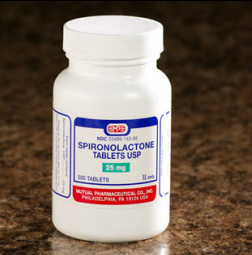 I like spironolactone, it is a great drug for the treatment of resistant hypertension and it has excellent evidence for treatment of poor left ventricular function and heart failure. So this week I read with interest the results of the Aldo-HF trial published in JAMA. This trial asked whether, in patients with heart failure and normal ejection fraction (HFNEF), addition of spironolactone improves echocardiographic measures of diastolic function and/or maximum exercise capacity measured by cardiopulmonary exercise testing. The results are stunningly unimpressive, which must come as a disappointment for the investigators after all the hard work of setting up and performing the trial and for cardiologists still trying to manage this difficult condition. The trial showed a small decrease in an echo measure of diastolic function known as E/E' which is regarded as a surrogate marker for left ventricular filling pressure/left atrial pressure. In spironolactone treated patients E/E' fell from 12.7± 3.6 to 12.1± 3.7 compared to a small increase in placebo group (12.8±4.4 to 13.6±4.3). Those of us practicing echocardiography realise this change is of no clinical signficance and within the day to day variability seen when performing echo. Importantly there was no change in symptoms (NYHA class) or VO2 max in the spironolactone patients. This supports the idea that the echocardiographic changes may be statistically significant but are not clinically significant. Was there anything positive from this trial? It does confirm the place of spironolactone as an effective antihypertensive agent. The BP difference in the spironolactone and placebo groups was 8/3mmHg. There was a small reduction in LV mass index noted (-6g/m2). The authors suggest this was independent of the blood pressure changes and they performed corrections for blood pressure to substantiate this conclusion. I am sceptical about this because other studies have shown that spironolactone reduces central aortic blood pressure significantly more than brachial blood pressure. Central aortic pressure is a more important determinant of afterload and hence a greater stimulus for alteration in LV mass. The other issue for comment, central to all trials of HFNEF, regards the type of patients included in the study. My typical HFNEF patient is an elderly lady with a long history of hypertension and often atrial fibrillation. The main symptoms are usually exertional shortness of breath and fatigue sometimes with ankle oedema. The BNP is often mildly raised and the echo usually shows a small cavity left ventricle with a dilated left atrium. In my experience these patients often respond to spironolactone at least in terms of an improvement in BP control and sometimes symptoms. The rapid rise in blood pressure and heart during exercise also seems to predict a group of more symptomatic patients. In the Aldo-HF trial 50% were female, only 4% had atrial fibrillation and the NT-proBNP at baseline was only 158. The Minnesota Living with Heart Failure score was 21 which is low and suggests that the patients in the clinical trial were mildly symptomatic at the start of the trial. So what is next for spironolactone? The Aldo-HF trial is disappointing but we need to await the results of the forthcoming TOPCAT study which is looking a spironolactone in over 3445 patients with HFNEF (EF>45%) and NTproBNP >360 or a previous admission to hospital with heart failure. This is likely to be a more severe group of patients than the Aldo-HF trial and the results are keenly awaited. The primary completion date is June 2013 so the results are likely to be reported at the AHA meeting this autumn. References The Miracle of Low Dose Spironolactone Laragh, Am J Hypertension 2001, 14:86-89 Effect of Spironolactone on Diastolic Function and Exercise Capacity in Patients With Heart Failure With Preserved Ejection Fraction: The Aldo-DHF Randomized Controlled Trial JAMA Spironolactone on central aortic blood pressure and LV mass in CKD TOPCAT Study Design
0 Comments
|
Dr Richard BogleThe opinions expressed in this blog are strictly those of the author and should not be construed as the opinion or policy of my employers nor recommendations for your care or anyone else's. Always seek professional guidance instead. Archives
August 2023
Categories
All
|
 RSS Feed
RSS Feed

